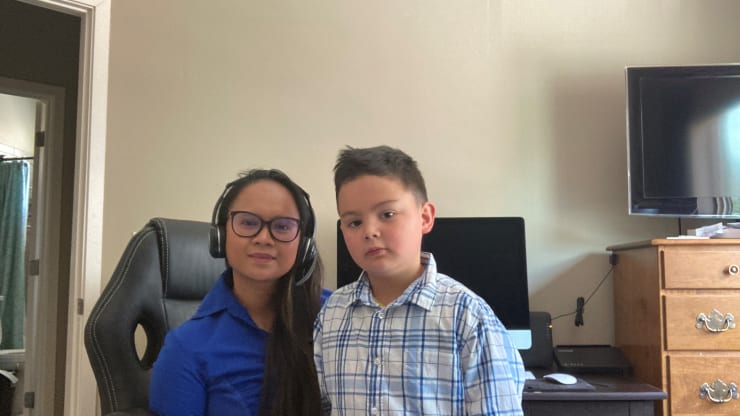NexRep, which lets people do call center work from their homes, is seeing an unprecedented pool of workers as people in other jobs look for safer work-from-home options.
Teladoc’s virtual health visits jumped 92% in the first quarter, forcing the company to turn to outsourcing help from NexRep to manage the volume.
Instacart, another NexRep client, has increased its care team 15-fold since the spreading coronavirus led more consumers to order their groceries instead of going to the store.
When Gary Britton took over Teladoc’s call center operation six years ago, he shunned the outsourcing model and hired exclusively in-house so support reps could be part of the company culture. His strategy worked until surging demand early this year from the coronavirus forced Britton to look elsewhere.
“Our call volume just went through the ceiling,” said Britton, who lives in the Dallas area.
Teladoc offers virtual medical visits, a business that’s booming as many hospitals are at capacity and patients prefer to stay home to avoid potential exposure to Covid-19. To help manage the spike, Britton turned to NexRep, which hires contractors across the country for call center work.
NexRep, an 11-year-old company, was built for this moment. Its reps work remotely, allowing them to stay home with their kids or ailing relatives if needed. During the current pandemic, NexRep has enabled Teladoc to expand its contact center staff by 40% or more, depending on the week. Education has been another big market, with colleges nationwide going remote and needing to respond to a flood of student and parent inquiries.
The pool of workers available to NexRep is at an all-time high with the U.S. mired in its worst economic crisis since the Great Depression. The latest employment report showed that initial jobless claims totaled at least 1 million for a 17th straight week, and the hospitality and travel industries, in particular, have been decimated.
Grocery delivery provider Instacart, like Teladoc, has seen massive growth by giving consumers a way to get their essentials without going to the store. An Instacart spokesperson said the company has increased its care team by 15-fold, with help from NexRep, and has added agents from companies like Hilton and Hertz.
Better than ‘backbreaking labor’
Tamara Gordon, a 40-year-old single mother in Atlanta, joined NexRep in April to work on the Instacart account. Gordon is a full-time public school teacher who was working overnight shifts at an Amazon warehouse three nights a week to supplement her income.
Gordon said she was exhausted from the “backbreaking labor” as well as the 45-minute drive each way to the warehouse. When coronavirus numbers started rising, she faced the added concern of infecting herself and her teenage kids, so she started looking for jobs she could do from home. Through a Facebook post, she came across NexRep.
Gordon had to take a pay cut, from between $15 and $18 an hour at Amazon to $10 at NexRep. But she gets to choose her own hours and can take the work with her on vacation, logging on from the beach or while visiting family in Connecticut. For Instacart, she handles text chats or calls from people who didn’t receive their order or were sent damaged goods.
“I was leaving my kids home at night while going to Amazon and was super tired working during the day,” Gordon said. “I really like the flexibility of NexRep. It supplements my teacher income, which I need to do.”
Teddy Liaw, NexRep’s CEO, said his company was receiving 7,000 applications a week by mid-June, up from 2,000 before the pandemic. NexRep added 4,000 positions in three months, he said.
Workers typically make between $10 and $25 an hour, averaging $12 to $14, Liaw said. While they aren’t high-paying jobs, they can serve as an alternative for people who have worked in factories or supermarkets and are now worried about getting sick. They can also help Uber and Lyft drivers, who have seen ridership plummet.
Employees have to understand that it’s contract work, meaning they don’t get health benefits or vacation time. Liaw said that’s all made clear from the beginning.
“You don’t have to expose yourself to Covid and you don’t have to commute,” Liaw said. “These jobs aren’t tied to educational attainment and you can actually keep yourself and family safe.”
NexRep does all the due diligence on prospects before hiring them and assigning them to projects. Liaw said the company only accepts 3% to 5% of applicants. After they join and go through virtual training and certification, agents get to schedule their hours and can work from anywhere, as long as they have a solid internet connection.
Reysie Beekmann was working at a hospital in Colorado in March, and had to resign after schools closed so she could stay home with her 7-year-old son. Beekmann, 30, had tried NexRep in the past but didn’t put much effort into it. Now, in need of the income, she’s putting in 40 hours or more a week, starting as early as 3 a.m., which allows her to spend much of the day with her son.
Beekmann works as a rep for companies that pitch fitness products on TV infomercials. She earns commissions from sales and can make more if customers add to their purchase while on the call. Beekmann said she’s earned as much as about $1,400 in a week, and generally pulls in in two to three times her income from the hospital, where she worked in education.
“If I take a day off right now and want to make up for it, I can always do it,” said Beekmann. “The biggest selling point is to be able to be at home and spend more time with your family.”
Bringing work back to the U.S.
NexRep uses technology from Five9, whose cloud-based software powers contact centers. Like many cloud software providers, Five9′s stock price hit a record this month and is up 71% for the year as investors bet that the work-from-home trend is here to stay.
Five9 CEO Rowan Trollope said he expects to see an “onshoring” of labor, as companies with expanding customer support needs recognize that they can keep expenses down domestically by having people work remotely.
“With tens of millions of people out of work, it feels like a great opportunity to go after that talent and enable them to do customer support from their homes,” Trollope said.
Compared to Five9, Teladoc’s stock is having an even bigger year, up 160%. The company said in April that visits in the first quarter, jumped 92% from a year earlier, and it predicted that visits for the year would climb from 4.1 million in 2019 to between 8 million and 9 million in 2020.
In normal times, Britton operates Teladoc’s call center with 325 to 400 agents, skewing higher in flu season and lower in the summer. Britton said he could tell from the spikes in March that he was going to need far more people than he could hire.
NexRep was able to bring on 175 people almost right away. But Britton said that just as important as staffing up rapidly is having the capacity to scale back when demand drops.
“The key thing about using outsourcers is that you do have the ability to ramp up and ramp down quicker,” Britton said.






